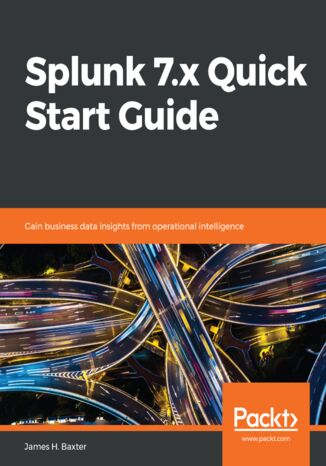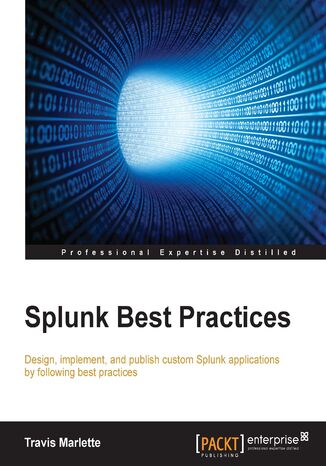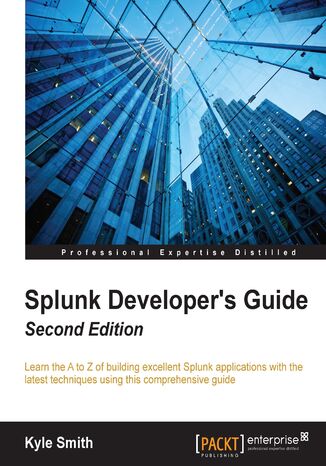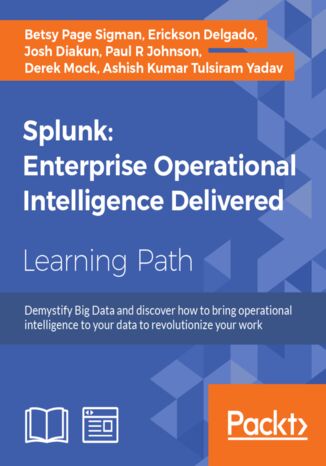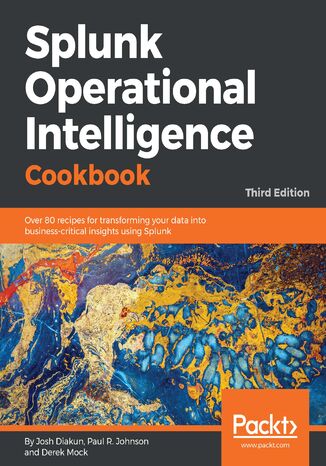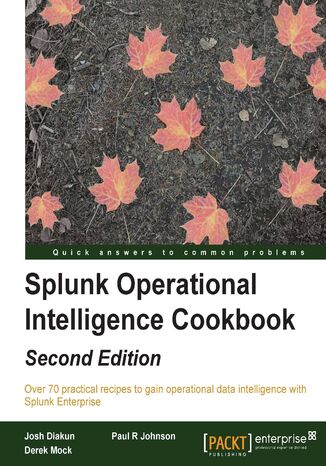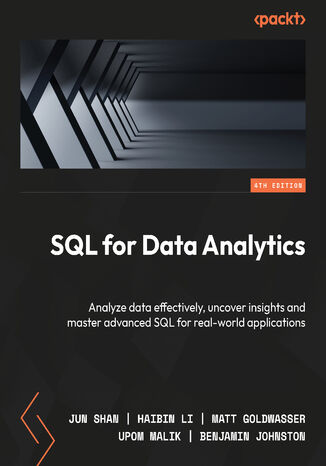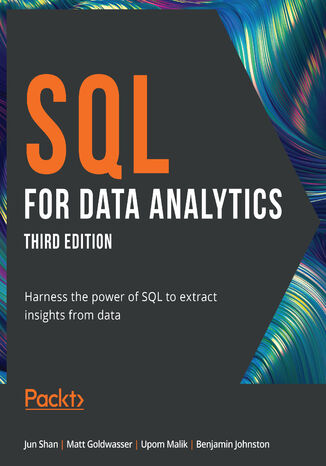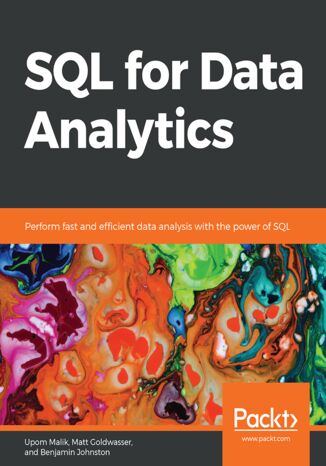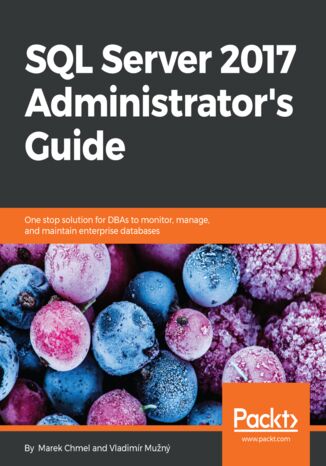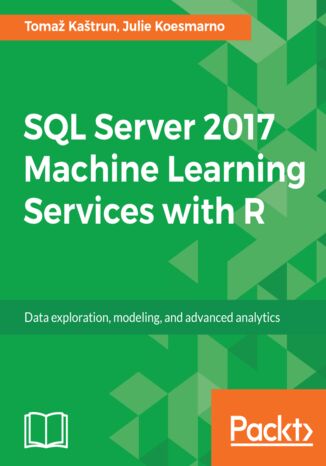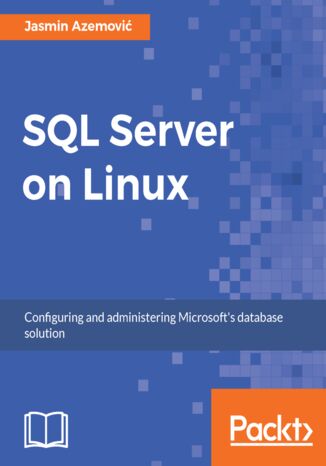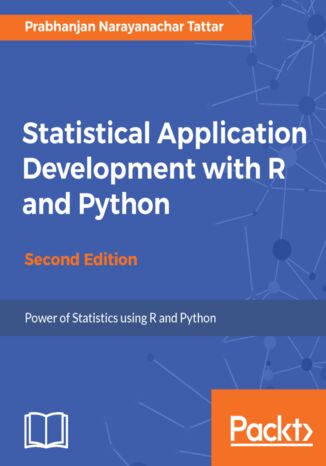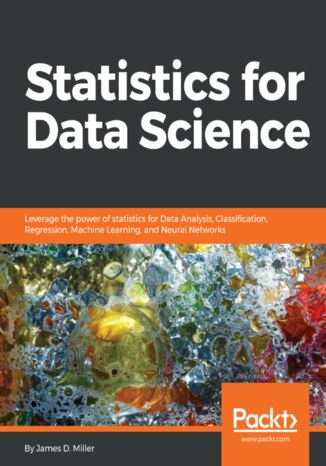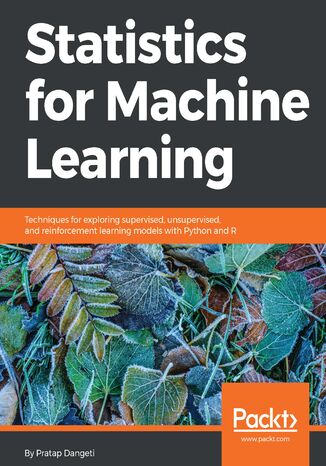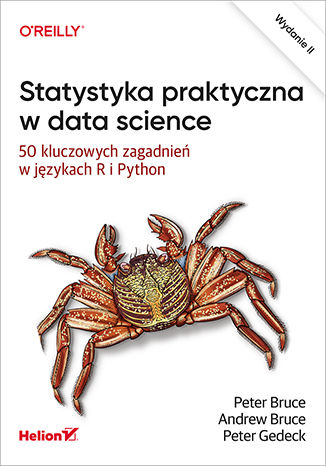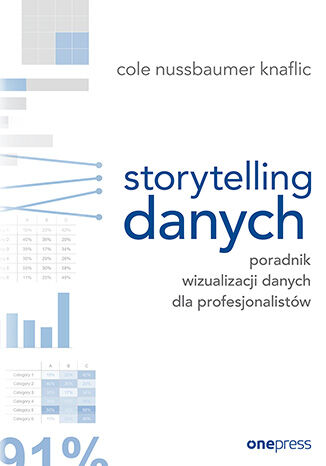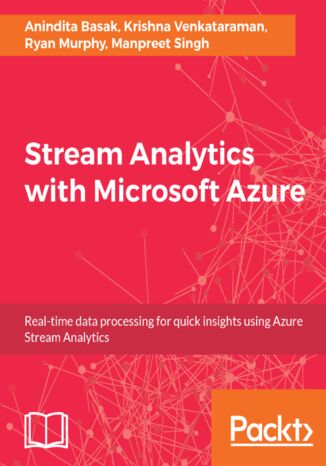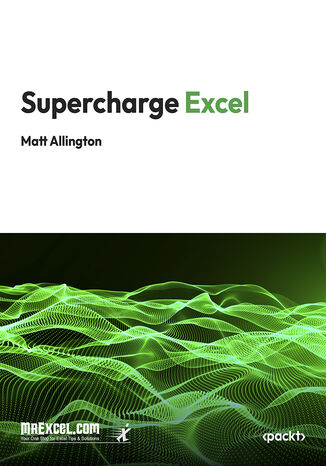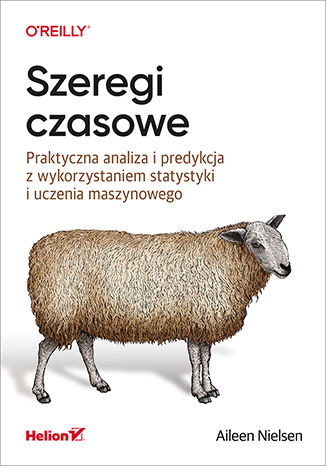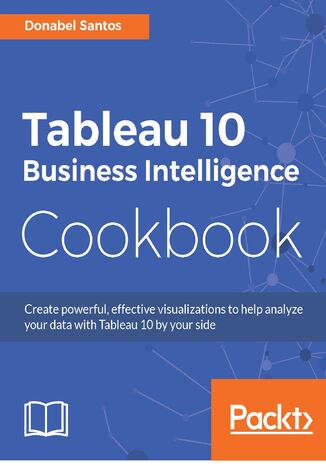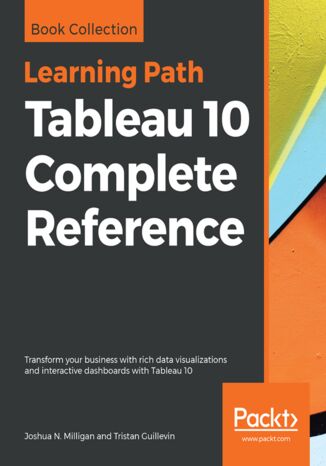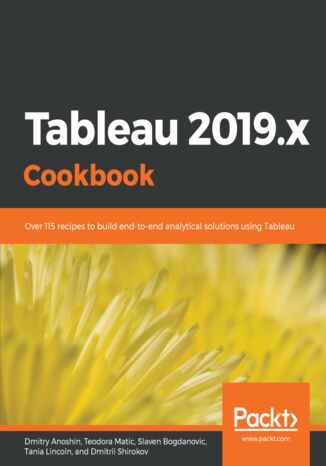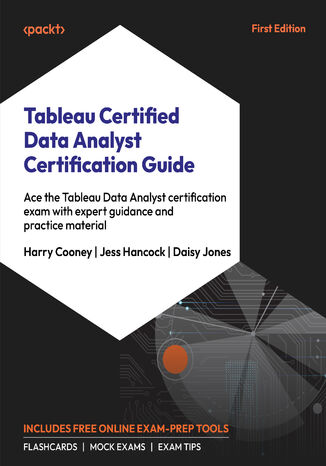Analiza danych
Splunk 7.x Quick Start Guide. Gain business data insights from operational intelligence
James H. Baxter
Splunk is a leading platform and solution for collecting, searching, and extracting value from ever increasing amounts of big data - and big data is eating the world! This book covers all the crucial Splunk topics and gives you the information and examples to get the immediate job done. You will find enough insights to support further research and use Splunk to suit any business environment or situation.Splunk 7.x Quick Start Guide gives you a thorough understanding of how Splunk works. You will learn about all the critical tasks for architecting, implementing, administering, and utilizing Splunk Enterprise to collect, store, retrieve, format, analyze, and visualize machine data. You will find step-by-step examples based on real-world experience and practical use cases that are applicable to all Splunk environments. There is a careful balance between adequate coverage of all the critical topics with short but relevant deep-dives into the configuration options and steps to carry out the day-to-day tasks that matter.By the end of the book, you will be a confident and proficient Splunk architect and administrator.
Splunk Best Practices. Operational intelligent made simpler
Travis Marlette
This book will give you an edge over others through insights that will help you in day-to-day instances. When you're working with data from various sources in Splunk and performing analysis on this data, it can be a bit tricky. With this book, you will learn the best practices of working with Splunk.You'll learn about tools and techniques that will ease your life with Splunk, and will ultimately save you time. In some cases, it will adjust your thinking of what Splunk is, and what it can and cannot do.To start with, you'll get to know the best practices to get data into Splunk, analyze data, and package apps for distribution. Next, you'll discover the best practices in logging, operations, knowledge management, searching, and reporting. To finish off, we will teach you how to troubleshoot Splunk searches, as well as deployment, testing, and development with Splunk.
Kyle Smith
Splunk provides a platform that allows you to search data stored on a machine, analyze it, and visualize the analyzed data to make informed decisions. The adoption of Splunk in enterprises is huge, and it has a wide range of customers right from Adobe to Dominos. Using the Splunk platform as a user is one thing, but customizing this platform and creating applications specific to your needs takes more than basic knowledge of the platform. This book will dive into developing Splunk applications that cater to your needs of making sense of data and will let you visualize this data with the help of stunning dashboards. This book includes everything on developing a full-fledged Splunk application?right from designing to implementing to publishing. We will design the fundamentals to build a Splunk application and then move on to creating one. During the course of the book, we will cover application data, objects, permissions, and more. After this, we will show you how to enhance the application, including branding, workflows, and enriched data. Views, dashboards, and web frameworks are also covered. This book will showcase everything new in the latest version of Splunk?including the latest data models, alert actions, XML forms, various dashboard enhancements, and visualization options (with D3). Finally, we take a look at the latest Splunk cloud applications, advanced integrations, and development as per the latest release.
Splunk: Enterprise Operational Intelligence Delivered. Machine data made accessible
Derek Mock, Betsy Page Sigman, Paul R....
Splunk is an extremely powerful tool for searching, exploring, and visualizing data of all types. Splunk is becoming increasingly popular, as more and more businesses, both large and small, discover its ease and usefulness. Analysts, managers, students, and others can quickly learn how to use the data from their systems, networks, web traffic, and social media to make attractive and informative reports. This course will teach everything right from installing and configuring Splunk.The first module is for anyone who wants to manage data with Splunk. You’ll start with very basics of Splunk— installing Splunk— before then moving on to searching machine data with Splunk. You will gather data from different sources, isolate them by indexes, classify them into source types, and tag them with the essential fields.With more than 70 recipes on hand in the second module that demonstrate all of Splunk’s features, not only will you find quick solutions to common problems, but you’ll also learn a wide range of strategies and uncover new ideas that will make you rethink what operational intelligence means to you and your organization.Dive deep into Splunk to find the most efficient solution to your data problems in the third module. Create the robust Splunk solutions you need to make informed decisions in big data machine analytics. From visualizations to enterprise integration, this well-organized high level guide has everything you need for Splunk mastery.This learning path combines some of the best that Packt has to offer into one complete, curated package. It includes content from the following Packt products:• Splunk Essentials - Second Edition• Splunk Operational Intelligence Cookbook - Second Edition• Advanced Splunk
Josh Diakun, Paul R. Johnson, Derek Mock
Splunk makes it easy for you to take control of your data, and with Splunk Operational Cookbook, you can be confident that you are taking advantage of the Big Data revolution and driving your business with the cutting edge of operational intelligence and business analytics.With more than 80 recipes that demonstrate all of Splunk’s features, not only will you find quick solutions to common problems, but you’ll also learn a wide range of strategies and uncover new ideas that will make you rethink what operational intelligence means to you and your organization.You’ll discover recipes on data processing, searching and reporting, dashboards, and visualizations to make data shareable, communicable, and most importantly meaningful. You’ll also find step-by-step demonstrations that walk you through building an operational intelligence application containing vital features essential to understanding data and to help you successfully integrate a data-driven way of thinking in your organization.Throughout the book, you’ll dive deeper into Splunk, explore data models and pivots to extend your intelligence capabilities, and perform advanced searching with machine learning to explore your data in even more sophisticated ways. Splunk is changing the business landscape, so make sure you’re taking advantage of it.
Josh Diakun, Derek Mock, Paul R. Johnson
Splunk makes it easy for you to take control of your data, and with Splunk Operational Cookbook, you can be confident that you are taking advantage of the Big Data revolution and driving your business with the cutting edge of operational intelligence and business analytics. With more than 70 recipes that demonstrate all of Splunk’s features, not only will you find quick solutions to common problems, but you’ll also learn a wide range of strategies and uncover new ideas that will make you rethink what operational intelligence means to you and your organization.You’ll discover recipes on data processing, searching and reporting, dashboards, and visualizations to make data shareable, communicable, and most importantly meaningful. You’ll also find step-by-step demonstrations that walk you through building an operational intelligence application containing vital features essential to understanding data and to help you successfully integrate a data-driven way of thinking in your organization.Throughout the book, you’ll dive deeper into Splunk, explore data models and pivots to extend your intelligence capabilities, and perform advanced searching to explore your data in even more sophisticated ways. Splunk is changing the business landscape, so make sure you’re taking advantage of it.
Jun Shan, Haibin Li, Matt Goldwasser, Upom...
SQL remains one of the most essential tools for modern data analysis and mastering it can set you apart in a competitive data landscape. This book helps you go beyond basic query writing to develop a deep, practical understanding of how SQL powers real-world decision-making. SQL for Data Analytics, Fourth Edition, is for anyone who wants to go beyond basic SQL syntax and confidently analyze real-world data. Whether you're trying to make sense of production data for the first time or upgrading your analytics toolkit, this book gives you the skills to turn data into actionable outcomes. You'll start by creating and managing structured databases before advancing to data retrieval, transformation, and summarization. From there, you’ll take on more complex tasks such as window functions, statistical operations, and analyzing geospatial, time-series, and text data. With hands-on exercises, case studies, and detailed guidance throughout, this book prepares you to apply SQL in everyday business contexts, whether you're cleaning data, building dashboards, or presenting findings to stakeholders. By the end, you'll have a powerful SQL toolkit that translates directly to the work analysts do every day. *Email sign-up and proof of purchase required
SQL for Data Analytics. Harness the power of SQL to extract insights from data - Third Edition
Jun Shan, Matt Goldwasser, Upom Malik, Benjamin...
Every day, businesses operate around the clock, and a huge amount of data is generated at a rapid pace. This book helps you analyze this data and identify key patterns and behaviors that can help you and your business understand your customers at a deep, fundamental level.SQL for Data Analytics, Third Edition is a great way to get started with data analysis, showing how to effectively sort and process information from raw data, even without any prior experience.You will begin by learning how to form hypotheses and generate descriptive statistics that can provide key insights into your existing data. As you progress, you will learn how to write SQL queries to aggregate, calculate, and combine SQL data from sources outside of your current dataset. You will also discover how to work with advanced data types, like JSON. By exploring advanced techniques, such as geospatial analysis and text analysis, you will be able to understand your business at a deeper level. Finally, the book lets you in on the secret to getting information faster and more effectively by using advanced techniques like profiling and automation. By the end of this book, you will be proficient in the efficient application of SQL techniques in everyday business scenarios and looking at data with the critical eye of analytics professional.
SQL for Data Analytics. Perform fast and efficient data analysis with the power of SQL
Upom Malik, Matt Goldwasser, Benjamin Johnston
Understanding and finding patterns in data has become one of the most important ways to improve business decisions. If you know the basics of SQL, but don't know how to use it to gain the most effective business insights from data, this book is for you.SQL for Data Analytics helps you build the skills to move beyond basic SQL and instead learn to spot patterns and explain the logic hidden in data. You'll discover how to explore and understand data by identifying trends and unlocking deeper insights. You'll also gain experience working with different types of data in SQL, including time-series, geospatial, and text data. Finally, you'll learn how to increase your productivity with the help of profiling and automation.By the end of this book, you'll be able to use SQL in everyday business scenarios efficiently and look at data with the critical eye of an analytics professional.Please note: if you are having difficulty loading the sample datasets, there are new instructions uploaded to the GitHub repository. The link to the GitHub repository can be found in the book's preface.
Marek Chmel, Vladimir Muzny
Take advantage of the real power of SQL Server 2017 with all its new features, in addition to covering core database administration tasks. This book will give you a competitive advantage by helping you quickly learn how to design, manage, and secure your database solution. You will learn how to set up your SQL Server and configure new (and existing) environments for optimal use. After covering the designing aspect, the book delves into performance-tuning aspects by teaching you how to effectively use indexes. The book will also teach you about certain choices that need to be made about backups and how to implement a rock-solid security policy and keep your environment healthy. Finally, you will learn about the techniques you should use when things go wrong, and other important topics, such as migration, upgrading, and consolidation, are covered in detail. Integration with Azure is also covered in depth. Whether you are an administrator or thinking about entering the field, this book will provide you with all the skills you need to successfully create, design, and deploy databases usingSQL Server 2017.
SQL Server 2017 Machine Learning Services with R. Data exploration, modeling, and advanced analytics
Julie Koesmarno, Toma?ae Ka?°trun
R Services was one of the most anticipated features in SQL Server 2016, improved significantly and rebranded as SQL Server 2017 Machine Learning Services. Prior to SQL Server 2016, many developers and data scientists were already using R to connect to SQL Server in siloed environments that left a lot to be desired, in order to do additional data analysis, superseding SSAS Data Mining or additional CLR programming functions. With R integrated within SQL Server 2017, these developers and data scientists can now benefit from its integrated, effective, efficient, and more streamlined analytics environment. This book gives you foundational knowledge and insights to help you understand SQL Server 2017 Machine Learning Services with R. First and foremost, the book provides practical examples on how to implement, use, and understand SQL Server and R integration in corporate environments, and also provides explanations and underlying motivations. It covers installing Machine Learning Services;maintaining, deploying, and managing code;and monitoring your services. Delving more deeply into predictive modeling and the RevoScaleR package, this book also provides insights into operationalizing code and exploring and visualizing data. To complete the journey, this book covers the new features in SQL Server 2017 and how they are compatible with R, amplifying their combined power.
SQL Server on Linux. Configuring and administering your SQL Server solution on Linux
Jasmin Azemovifá
Microsoft's launch of SQL Server on Linux has made SQL Server a truly versatile platform across different operating systems and data-types, both on-premise and on-cloud.This book is your handy guide to setting up and implementing your SQL Server solution on the open source Linux platform. You will start by understanding how SQL Server can be installed on supported and unsupported Linux distributions. Then you will brush up your SQL Server skills by creating and querying database objects and implementing basic administration tasks to support business continuity, including security and performance optimization. This book will also take you beyond the basics and highlight some advanced topics such as in-memory OLTP and temporal tables.By the end of this book, you will be able to recognize and utilize the full potential of setting up an efficient SQL Server database solution in your Linux environment.
Prabhanjan Narayanachar Tattar
Statistical Analysis involves collecting and examining data to describe the nature of data that needs to be analyzed. It helps you explore the relation of data and build models to make better decisions.This book explores statistical concepts along with R and Python, which are well integrated from the word go. Almost every concept has an R code going with it which exemplifies the strength of R and applications. The R code and programs have been further strengthened with equivalent Python programs. Thus, you will first understand the data characteristics, descriptive statistics and the exploratory attitude, which will give you firm footing of data analysis. Statistical inference will complete the technical footing of statistical methods. Regression, linear, logistic modeling, and CART, builds the essential toolkit. This will help you complete complex problems in the real world.You will begin with a brief understanding of the nature of data and end with modern and advanced statistical models like CART. Every step is taken with DATA and R code, and further enhanced by Python.The data analysis journey begins with exploratory analysis, which is more than simple, descriptive, data summaries. You will then apply linear regression modeling, and end with logistic regression, CART, and spatial statistics.By the end of this book you will be able to apply your statistical learning in major domains at work or in your projects.
James D. Miller
Data science is an ever-evolving field, which is growing in popularity at an exponential rate. Data science includes techniques and theories extracted from the fields of statistics; computer science, and, most importantly, machine learning, databases, data visualization, and so on.This book takes you through an entire journey of statistics, from knowing very little to becoming comfortable in using various statistical methods for data science tasks. It starts off with simple statistics and then move on to statistical methods that are used in data science algorithms. The R programs for statistical computation are clearly explained along with logic. You will come across various mathematical concepts, such as variance, standard deviation, probability, matrix calculations, and more. You will learn only what is required to implement statistics in data science tasks such as data cleaning, mining, and analysis. You will learn the statistical techniques required to perform tasks such as linear regression, regularization, model assessment, boosting, SVMs, and working with neural networks.By the end of the book, you will be comfortable with performing various statistical computations for data science programmatically.
Pratap Dangeti
Complex statistics in machine learning worry a lot of developers. Knowing statistics helps you build strong machine learning models that are optimized for a given problem statement.This book will teach you all it takes to perform the complex statistical computations that are required for machine learning. You will gain information on the statistics behind supervised learning, unsupervised learning, reinforcement learning, and more. You will see real-world examples that discuss the statistical side of machine learning and familiarize yourself with it. You will come across programs for performing tasks such as modeling, parameter fitting, regression, classification, density collection, working with vectors, matrices, and more.By the end of the book, you will have mastered the statistics required for machine learning and will be able to apply your new skills to any sort of industry problem.
Statystyka praktyczna w data science. 50 kluczowych zagadnień w językach R i Python. Wydanie II
Peter Bruce, Andrew Bruce, Peter Gedeck
Metody statystyczne są kluczowym narzędziem w data science, mimo to niewielu analityków danych zdobyło wykształcenie w ich zakresie. Może im to utrudniać uzyskiwanie dobrych efektów. Zrozumienie praktycznych zasad statystyki okazuje się ważne również dla programistów R i Pythona, którzy tworzą rozwiązania dla data science. Kursy podstaw statystyki rzadko jednak uwzględniają tę perspektywę, a większość podręczników do statystyki w ogóle nie zajmuje się narzędziami wywodzącymi się z informatyki. To drugie wydanie popularnego podręcznika statystyki przeznaczonego dla analityków danych. Uzupełniono je o obszerne przykłady w Pythonie oraz wyjaśnienie, jak stosować poszczególne metody statystyczne w problemach data science, a także jak ich nie używać. Skoncentrowano się też na tych zagadnieniach statystyki, które odgrywają istotną rolę w data science. Wyjaśniono, które koncepcje są ważne i przydatne z tej perspektywy, a które mniej istotne i dlaczego. Co ważne, poszczególne koncepcje i zagadnienia praktyczne przedstawiono w sposób przyswajalny i zrozumiały również dla osób nienawykłych do posługiwania się statystyką na co dzień. W książce między innymi: analiza eksploracyjna we wstępnym badaniu danych próby losowe a jakość dużych zbiorów danych podstawy planowania eksperymentów regresja w szacowaniu wyników i wykrywaniu anomalii statystyczne uczenie maszynowe uczenie nienadzorowane a znaczenie danych niesklasyfikowanych Statystyka: klasyczne narzędzia w najnowszych technologiach!
Storytelling danych. Poradnik wizualizacji danych dla profesjonalistów
Cole Nussbaumer Knaflic
Rozwój technologiczny nie tylko zwiększył ilość i dostępność danych, ale również zaowocował wszechobecnością narzędzi do ich obróbki i prezentacji. W zasadzie każdy może tworzyć diagramy i prezentacje. Aby przykuć uwagę odbiorcy i przekazać mu informację zawartą w zbiorze danych, sama wiedza techniczna nie wystarczy. Problem wynika z tego, że większość ludzi nie ma naturalnej umiejętności przekładania danych na interesujące historie. Tego się po prostu trzeba nauczyć. Dopiero wtedy można mówić o skutecznym przekazie. Ta książka jest przewodnikiem dla każdego, kto musi przekazywać informacje, robiąc przy tym użytek z danych. Szczególnie wartościowa będzie dla analityków, studentów i naukowców, a także dla każdego, kto w swojej komunikacji odwołuje się do danych. Pokazano tu prostą i intuicyjną technikę przedstawiania historii przy użyciu danych w sześciu krokach („lekcjach”). Skuteczność tej metody potwierdzono wieloma przykładami zaczerpniętymi z przeróżnych branż. Poszczególne procesy zaprezentowano za pomocą instrukcji „krok po kroku”, opisano także tok rozumowania podczas realizacji projektu graficznej wizualizacji danych. Przy tym wszystkim zawarte w książce praktyczne wskazówki są gotowe do natychmiastowego zastosowania. Sześć kluczowych lekcji skutecznej komunikacji wizualnej: Zrozumienie kontekstu. Wybór odpowiedniego wykresu. Eliminacja śmieci. Kierowanie uwagą odbiorców. Myślenie niczym projektant. Przedstawianie historii. Dane nadają sens prezentacji!
Krishnaswamy Venkataraman, Anindita Basak, Ryan Murphy, Manpreet...
Microsoft Azure is a very popular cloud computing service used by many organizations around the world. Its latest analytics offering, Stream Analytics, allows you to process and get actionable insights from different kinds of data in real-time. This book is your guide to understanding the basics of how Azure Stream Analytics works, and building your own analytics solution using its capabilities. You will start with understanding what Stream Analytics is, and why it is a popular choice for getting real-time insights from data. Then, you will be introduced to Azure Stream Analytics, and see how you can use the tools and functions in Azure to develop your own Streaming Analytics. Over the course of the book, you will be given comparative analytic guidance on using Azure Streaming with other Microsoft Data Platform resources such as Big Data Lambda Architecture integration for real time data analysis and differences of scenarios for architecture designing with Azure HDInsight Hadoop clusters with Storm or Stream Analytics. The book also shows you how you can manage, monitor, and scale your solution for optimal performance.By the end of this book, you will be well-versed in using Azure Stream Analytics to develop an efficient analytics solution that can work with any type of data.
Supercharge Excel. Learn How to Write DAX for Power Pivot
MrExcel's Holy Macro! Books, Matt Allington
This guide empowers you to master Excel and Data Analysis Expressions (DAX), guiding you from the basics of data modeling to advanced DAX functions. You'll begin by learning how to load and structure data effectively, then dive into essential DAX functions like SUM, COUNT, and FILTER, which are crucial for accurate data manipulation. As you progress, the book covers advanced concepts such as context transition, calculated columns, and time intelligence, enabling you to perform sophisticated data analyses.By incorporating hands-on exercises, the guide ensures that you can apply what you've learned to real-world scenarios. You'll also explore advanced topics like disconnected tables and cube formulas, expanding your ability to create dynamic models and dashboards. Towards the end, the guide introduces transitioning from Excel to Power BI, helping you leverage your Excel expertise in a more powerful environment.This book is perfect for technical professionals and Excel power users looking to enhance their data analysis skills and transition smoothly to Power BI. By the end, you'll have the knowledge and tools to take your data modeling and analysis to the next level.
Szeregi czasowe. Praktyczna analiza i predykcja z wykorzystaniem statystyki i uczenia maszynowego
Aileen Nielsen
Analiza szeregów czasowych zyskuje na znaczeniu. Wraz z postępującą digitalizacją danych służby zdrowia, rozwojem inteligentnych miast czy upowszechniającym się internetem rzeczy staje się coraz bardziej potrzebna. Obiecującym rozwiązaniem jest analiza szeregów czasowych metodami wspomaganymi uczeniem maszynowym. Techniki te umożliwiają skuteczne monitorowanie i wykorzystywanie coraz większych zbiorów danych. Być może ich zastosowanie do pracy z szeregami czasowymi wydaje się nieoczywiste, jednak bez analiz szeregów czasowych nie można w pełni wykorzystać zebranych danych. Ta książka jest szerokim, aktualnym i praktycznym przeglądem metod analizy szeregów czasowych, w którym ujęto pełny potok przetwarzania danych czasowych i modelowania. Zaprezentowano w niej rzeczywiste przypadki użycia tych metod i zilustrowano je obszernymi fragmentami znakomicie zaprojektowanego kodu w językach R i Python. Znalazły się tutaj praktyczne wskazówki ułatwiające rozwiązywanie najczęstszych problemów występujących w inżynierii danych czasowych i ich analizie. Ujęto tu zarówno konwencjonalne metody statystyczne, jak i nowoczesne techniki uczenia maszynowego. To bardzo przydatny przewodnik, dzięki któremu analitycy danych, inżynierowie oprogramowania i naukowcy będą mogli płynnie przejść od podstaw pracy z szeregami czasowymi do rozwiązywania konkretnych zagadnień na profesjonalnym poziomie. Dzięki tej książce nauczysz się: pozyskiwać, przechowywać i przetwarzać szeregi czasowe eksplorować dane czasowe i symulować je wykonywać pomiary błędów pracować z szeregami czasowymi za pomocą uczenia maszynowego lub uczenia głębokiego oceniać dokładność i wydajność modeli Skutecznie analizuj szeregi czasowe i wydobywaj bezcenną wiedzę!
Tableau 10 Business Intelligence Cookbook. Create powerful, effective visualizations with Tableau 10
Donabel Santos, Paul Banoub
Tableau is a software tool that can speed up data analysis through its rich visualization capabilities, and help uncover insights for better and smarter decision making. This book is for the business, technology, data and analytics professionals who use and analyze data and data-driven approaches to support business operations and strategic initiatives in their organizations.This book provides easy-to-follow recipes to get the reader up and running with Tableau 10, and covers basic to advanced use cases and scenarios. The book starts with building basic charts in Tableau and moves on to building more complex charts by incorporating different Tableau features and interactivity components. There is an entire chapter dedicated to dashboard techniques and best practices. A number of recipes specifically for geospatial visualization, analytics, and data preparation are also covered.By the end of this book, you’ll have gained confidence and competence to analyze and communicate data and insights more efficiently and effectively by creating compelling interactive charts, dashboards, and stories in Tableau.
Joshua N. Milligan, Tristan Guillevin
Graphical presentation of data enables us to easily understand complex data sets. Tableau 10 Complete Reference provides easy-to-follow recipes with several use cases and real-world business scenarios to get you up and running with Tableau 10.This Learning Path begins with the history of data visualization and its importance in today's businesses. You'll also be introduced to Tableau - how to connect, clean, and analyze data in this visual analytics software. Then, you'll learn how to apply what you've learned by creating some simple calculations in Tableau and using Table Calculations to help drive greater analysis from your data. Next, you'll explore different advanced chart types in Tableau. These chart types require you to have some understanding of the Tableau interface and understand basic calculations. You’ll study in detail all dashboard techniques and best practices. A number of recipes specifically for geospatial visualization, analytics, and data preparation are also covered. Last but not least, you'll learn about the power of storytelling through the creation of interactive dashboards in Tableau. Through this Learning Path, you will gain confidence and competence to analyze and communicate data and insights more efficiently and effectively by creating compelling interactive charts, dashboards, and stories in Tableau.This Learning Path includes content from the following Packt products:• Learning Tableau 10 - Second Edition by Joshua N. Milligan• Getting Started with Tableau 2018.x by Tristan Guillevin
Tableau 2019.x Cookbook. Over 115 recipes to build end-to-end analytical solutions using Tableau
Dmitry Anoshin, Teodora Matic, Slaven Bogdanovic, Tania...
Tableau has been one of the most popular business intelligence solutions in recent times, thanks to its powerful and interactive data visualization capabilities. Tableau 2019.x Cookbook is full of useful recipes from industry experts, who will help you master Tableau skills and learn each aspect of Tableau's ecosystem.This book is enriched with features such as Tableau extracts, Tableau advanced calculations, geospatial analysis, and building dashboards. It will guide you with exciting data manipulation, storytelling, advanced filtering, expert visualization, and forecasting techniques using real-world examples. From basic functionalities of Tableau to complex deployment on Linux, you will cover it all. Moreover, you will learn advanced features of Tableau using R, Python, and various APIs. You will learn how to prepare data for analysis using the latest Tableau Prep. In the concluding chapters, you will learn how Tableau fits the modern world of analytics and works with modern data platforms such as Snowflake and Redshift. In addition, you will learn about the best practices of integrating Tableau with ETL using Matillion ETL.By the end of the book, you will be ready to tackle business intelligence challenges using Tableau's features.
Harry Cooney, Daisy Jones
The Tableau Certified Data Analyst certification validates the essential skills needed to explore, analyze, and present data, propelling your career in data analytics. Whether you're a seasoned Tableau user or just starting out, this comprehensive resource is your roadmap to mastering Tableau and achieving certification success.The book begins by exploring the fundamentals of data analysis, from connecting to various data sources to transforming and cleaning data for meaningful insights. With practical exercises and realistic mock exams, you'll gain hands-on experience that reinforces your understanding of Tableau concepts and prepares you for the challenges of the certification exam.As you progress, expert guidance and clear explanations make it easy to navigate complex topics as each chapter builds upon the last, providing a seamless learning experience—from creating impactful visualizations to managing content on Tableau Cloud.Written by a team of experts, this Tableau book not only helps you pass the certification exam but also equips you with the skills and confidence needed to excel in your career. It is an indispensable resource for unlocking the full potential of Tableau.

